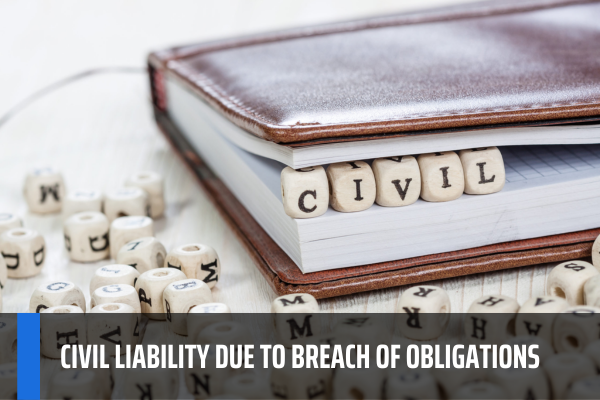What are examples of civil violations? What are the regulations on civil liability due to breach of obligations in Vietnam?
Vietnam: What are examples of civil violations?
A civil violation is an illegal and at-fault act committed by a subject with legal capacity, violating property relationships, personal relationships attached to property, and non-property personal relationships.
Specifically, the violating subject in this case does not perform or performs incorrectly or incompletely their obligations in a civil legal relationship.
Common examples of civil violations (civil violations) include:
- Violation of principles and prohibitions of the Civil Code
- Violation of civil obligations
- Violation of civil contracts
- Violation of civil law outside of contract
- Other violations of the legitimate rights and interests of individuals, organizations, etc.
Below are specific examples of civil violations:
- A lends B a sum of money (with loan documents), clearly agreeing on a repayment period of 02 months. However, when the debt is due, the borrower does not fulfill the debt repayment obligation and begs over and over again.
- Company A signs a sales contract with company B for 2 tons of wheat flour. According to the agreement, Party A is responsible for delivering goods to Party B on August 24, 2022. However, on the delivery date, A did not bring the agreed quantity of goods, which affected Party B's production process.

What are examples of civil violations? What are the regulations on civil liability due to breach of obligations in Vietnam? (Image from the Internet)
What are the regulations on civil liability due to breach of obligations in Vietnam?
Article 351 of the 2015 Civil Code stipulates civil liability due to breach of obligations as follows:
Civil liability arising from breach of civil obligations
1. An obligor which fails to perform or performs incorrectly an obligation has civil liability to the obligee.
Breach of obligations means that the obligor fails to perform the obligations on time, perform the obligations incompletely or incorrectly.
2. Where an obligor is not able to perform a civil obligation due to an event of force majeure, it shall not have civil liability, unless otherwise agreed or otherwise provided by law.
3. An obligor shall not have civil liability if it is able to prove that failure to perform an obligation is due entirely to the fault of the obligee.
Accordingly, responsibility for performing obligations
- An obligor which fails to perform or performs incorrectly an obligation has civil liability to the obligee.
Breach of obligations means that the obligor fails to perform the obligations on time, perform the obligations incompletely or incorrectly.
- Where an obligor is not able to perform a civil obligation due to an event of force majeure, it shall not have civil liability, unless otherwise agreed or otherwise provided by law.
- An obligor shall not have civil liability if it is able to prove that failure to perform an obligation is due entirely to the fault of the obligee.
What are the regulations on postponement of performance of civil obligations in Vietnam?
Article 354 of the 2015 Civil Code stipulates the postponement of performance of civil obligations as follows:
- When it is not possible to perform a civil obligation on time, the obligor must inform immediately the obligee and may suggest postponement of performance of the civil obligation.
In the case of failure to notify the obligee, the obligor must compensate for any damage arising, unless otherwise agreed or unless it was impossible to provide notification due to objective reasons.
- The obligor may postpone the performance of the obligation only if the obligee consents. The performance of the civil obligation in this case of postponement shall be deemed to be performance in a timely manner.
In addition, Article 355 of the 2015 Civil Code stipulates the late acceptance of performance of civil obligations as follows:
- The late acceptance of the performance of a civil obligation is where the time limit for the fulfillment of the civil obligation has expired and the obligor has already fulfilled the civil obligation as agreed but the obligee does not accept the performance of such obligation.
- When the subject matter of late acceptance of performance of a civil obligation is property, the obligor may hand over the property to a bailee must or take the necessary measures to take care of the property and is entitled to demand reimbursement of reasonable expenses. If the property is kept by a bailee, the obligor must notify the obligee.
- The obligor has the right to sell property which is in danger of being damaged or of deteriorating, and shall pay the proceeds of sale of such property to the obligee after deducting necessary expenses for the preservation and sale of the property.
LawNet